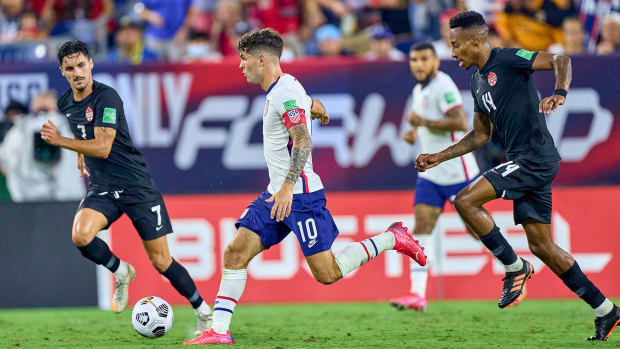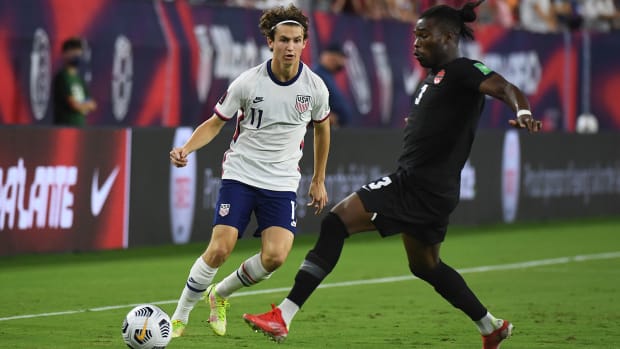It’s been just a shade over two years since the U.S. men’s national team last visited Canada, but it feels like there’s been a change of eras in the interim.
After decades in the international wilderness, Canada suddenly is a force to be reckoned with. Since their emphatic 2–0 defeat of the U.S. in Toronto in October 2019, the Canadians have risen an incredible 35 spots in the FIFA ranking (to 40th). And after failing to reach the final round of Concacaf’s World Cup qualifying competition for 24 years, they now lead the race for the region’s three guaranteed 2022 World Cup berths as the only undefeated side (5-0-4) in the Octagonal.
“They’ve certainly improved a lot over the past couple of years,” U.S. defender Walker Zimmerman said Saturday. “There’s been a shift in their mentality and they play with a chip on their shoulder. They play with something to prove, and they play with an intensity that is very high.”
Meanwhile, the U.S. (ranked 11th) has begun to live up to the promise of its unprecedented youth movement. That Nations League setback in Toronto was an early low point for coach Gregg Berhalter, who subsequently adjusted the team’s tactics and approach while fully embracing a new, talented and ambitious generation of players. The U.S. is historically young. It also wound up winning that Nations League tournament, followed by the 2021 Gold Cup. Coming off Thursday’s 1-0 victory over El Salvador, the Americans are now second in the Octagonal at 5-1-3.
Sunday afternoon’s top-the-table qualifying showdown in Hamilton, Ontario, will be another chapter in an unexpected story that began in late 2019. Nobody’s ticket to Qatar will be punched on the artificial surface at Tim Hortons Field, which will be at 50% capacity owing to Canadian pandemic protocols. But any points secured will be a welcome and hard-won bonus, especially with the tough stretch run to come. Both teams still have some treacherous travel ahead, with the U.S. hosting Honduras in frigid St. Paul, Minn., on Wednesday, before trips to Mexico and Costa Rica in the climactic March window.
“They’re top of the table and we're in second place, so there's an opportunity to become number one in the table, and that's valuable. The second thing is, anytime you can prevent a team from getting maximum points at home that's also valuable,” Berhalter said Saturday. “They've been doing a great job. We know it's a difficult team. We know it's going to be a good game, and it's about competing and playing our game and if we do that, we think we can be successful.”

Robin Alam/Icon Sportswire/Imago Images
Three demanding qualifiers in seven days, with international travel in between, necessarily requires lineup adjustments, squad rotation and fresh legs. It’s an inexact science, and Berhalter is blessed with more depth than most. It’s telling and somewhat symbolic that the U.S. is in second even though Christian Pulisic, Weston McKennie and Tyler Adams—the most prominent players at the core of this golden generation—started together for the first time in more than two years last Thursday in Columbus.
But finding precisely the right formula has proven elusive. Berhalter’s “one game at a time” mantra inevitably places greater focus on the first match of a qualifying window. In those contests, the Americans are 3-0-1, so far, with no goals conceded. And the U.S. possesses the depth, talent and chemistry to survive and excel when there’s a third game, where it’s 2-0-0 with a +4 goal differential. The bottom five teams in the Octagonal, which don’t have the depth or talent of the North American powers, are a combined 1-6-3 in third games.
The second match of a window, however, has proven to be a challenge for the U.S. Across September’s 1-1 draw with Canada in Nashville, the 1-0 loss to Panama in October and then the 1-1 tie at Jamaica in November, the Americans are winless and have mustered just two goals combined amid a dearth of clear-cut scoring chances. Each one has been a slog.
“We've been looking into that, and we don't know if it's a coincidence or what. But certainly the numbers have been down in the second game of the qualifying groups, and we want to change that. There's no question about it,” Berhalter acknowledged.
“We know [Sunday is] going to be a tough game—a physical game, and we're looking forward to the competitive nature of that game,” he continued. “One major takeaway that we've had since my time as coach is that first Canada away game in the Nations League is where we really fell flat from a competitive standpoint. So that's the emphasis in this game. We know that they're going to be fired up. We know they're playing in front of their home fans. We know they're going to be confident. It’s going to be competitive game, and if we can embrace that we’ll be O.K.”
Like the game in Hamilton, the second qualifiers of the first two windows were played on two full days rest. Against the Canadians in Nashville, Berhalter swapped out six starters from the opener in El Salvador. At Panama the following month, he fielded seven new starters. Berhalter has said that performance, rather than player selection or chemistry, was the issue during that moribund defeat in Panama City. But it’s easy to wonder whether he might try to field his strongest XI possible again in Hamilton, then save the more comprehensive lineup overhaul for last-place Honduras next week.
He’s already been forced into at least one change, however, as forward Tim Weah didn’t make the trip north because of his vaccination status. Weah has been the Americans’ most consistently effective attacker over the past three qualifiers, and he helped create Antonee Robinson’s winning goal against El Salvador.
But Berhalter explained Saturday that while Weah is considered fully vaccinated in France, where he plays for Lille, he doesn’t meet Canadian requirements. He’s had one shot and delayed the second while recovering from COVID-19. A few weeks ago, the prospect of a Weah-Alphonso Davies showdown on the right would’ve been a key storyline (not to mention sharing the field with Lille teammate and good friend Jonathan David, the Canadian striker). Now, both Weah and Davies are out. Davies, the Vancouver Whitecaps product and Bayern Munich star, is missing the entire window with post-COVID-19 myocarditis.

Christopher Hanewinckel/USA TODAY Sports
Brenden Aaronson, who came off the bench in Columbus but normally starts for Berhalter on the left, or perhaps Jordan Morris, are among the candidates to fill in for Weah on the right. Another key U.S. concern is on the opposite flank, where Pulisic struggled against El Salvador. His presence remains a weapon—the Salvadorans were so focused on the threat posed by Pulisic that Weah and Sergiño Dest had ample room to operate on the other side. But it’s clear that Pulisic, U.S. Soccer’s reigning male player of the year, isn’t in his best form. He’s occasionally been deployed out of his preferred position at Chelsea and then was left on the bench for three of the past four games.
“It's tough. It's definitely played a lot on me and mentally, it's been difficult at times,” he said last week.
Pulisic had difficulty solving El Salvador. He was dispossessed relatively frequently, often wound up retreating instead of running behind the defense and was unlucky during a couple of penalty area forays. Berhalter removed Pulisic in the 65th minute, which should leave him available for Sunday.
“I don't know if ‘frustration' is the right word for Christian’s performance,” Berhalter said. “You know he's a guy that does everything he can for the team to be successful. And he's a guy that you can count giving the effort needed to help the team. And I think that's the most important thing for us, for his teammates and for himself.
“It's just understanding that every player has their role within the team, and it's a very balanced team and we don't need one guy to be the hero necessarily. And I think there's maybe some unwanted pressure that Christian is putting on himself,” the manager continued. “He can be the perfect game-changer for us used in the right way. And for us, it's just getting the ball in good positions that he can hurt the opponent. And when we do that, when we can do that, I'm confident he's going to make an impact.”
One of the enduring images of that Nations League defeat two years ago was Pulisic in agony on the bench at BMO Field, at one point looking like he was in tears, after being pulled at the hour mark. That was a low point for a program and its young star, and lessons were learned that day. Sunday is yet another chance to show how far they’ve come. Finding their footing in Canada and solving the second-game puzzle would represent massive steps toward securing passage to the World Cup.
“If you guys remember what I said in 2019 after we lost to them, I said it’s a good team,” Berhalter said. “I didn’t think that team was given enough credit and here they are a couple years later, top of the table after nine games. They’re a well-coached team. … They have a clear philosophy and you know they deserve to be where they are right now. So for us, it's an opportunity.”







